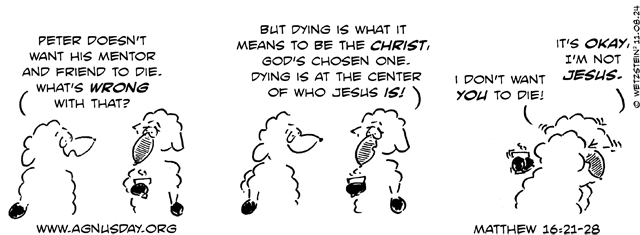Rock to Satan to Stumbling Block
This is the sermon I'll be preaching Sunday morning at St. Timothy Lutheran Church's Drive-In Worship. The text is Matthew 16:21-28.
Today we have part two of the story of Peter and Jesus, where Peter confesses Jesus as the Messiah, Jesus praises him for it and says he will build his church on this confession. Jesus called Peter a rock. Peter got it right! That was part one.
On to part two here, Jesus spells out what life will look like following him as Messiah. For the first time, Jesus mentions his suffering, death, and resurrection explicitly. Oh my, and if that happens to Jesus, it could happen to Peter too! Today, we see how that worked out for Peter as he went from rock to Satan and a stumbling block.
Peter took Jesus aside to speak privately with him. For a Jew of that time, the Messiah was a victorious figure who would deliver them from Roman domination. This talk of Jesus' death didn't jive with that, so of course, Peter tried to talk Jesus out of going down that path. Now if he follows Jesus to the cross, that means there's a cross waiting for him as well. In Peter's case, this was true. According to tradition, Peter was crucified but asked to be crucified upside down because he felt unworthy of being killed like his Lord was. Whether it was out of concern for Jesus as his friend and Master or out of self-concern that Peter had this exchange with Jesus, we don’t know.
Jesus’ response to Peter is shocking. Just a few verses after praising Peter's revelation that he is the Messiah, Jesus calls Peter Satan and puts him in his place. Disciples walked behind their teachers at that time. Jesus wasn't just telling the devil to leave but was directing his dear disciple to take the place of a disciple—behind Jesus.
Why was Jesus so harsh? There is a little Greek word for “must.” It is dei. A Greek reader would recognize a theological hint about the inevitability of the road Jesus must take to the cross. Dei means “it is necessary.” Also referred to as the “divine necessity,” implied in its use is that God is behind what is happening. In foretelling of what was to come, Matthew brings together divine providence and human responsibility. Both the authorities and Jesus choose the paths they take, as does Peter.
The crux of the issue in this gospel passage is the cross. Peter has gone from rock to stumbling block. His ideas block the road to the cross that Jesus is to take. Jesus was set on divine things, the will of his Father in heaven, while Peter was distracted with human things. He was being so earthly minded that he was no heavenly good.
When I think of the cross, I am reminded of martyr Dietrich Bonhoeffer and his writing in The Cost of Discipleship:
The cross is laid on every Christian. As we embark upon discipleship we surrender ourselves to Christ in union with his death—we give over our lives to death. Thus it begins the cross … meets us at the beginning of our communion with Christ. When Christ calls a man [or woman], he bids [them] come and die. But we do not want to die, and therefore Jesus Christ and his call are necessarily our death as well as our life. As Christ bears our burdens, so ought we to bear the burdens of our fellowman. The law of Christ, which it is our duty to fulfill, is the bearing of the cross. My brother’s [and sister’s] burden which I must bear is not only his [or her] outward life, [the] natural characteristics and gifts, but quite literally [their] sin. The call to follow Christ always means a call to share the word of forgiveness—the Christlike suffering which it is the Christian’s duty to bear. (Dietrich Bonhoeffer, The Cost of Discipleship (NY: Macmillan, 1963), 99-100.)
Following Christ requires faithful and courageous living, which is costly.
These are unprecedented times in which we live today. The pandemic, racial strife, political divisions; where will this all lead? We may understandably be afraid. All this talk of the way of the cross sounds so hard and we may feel so worn out. The thing is, when we follow Jesus, he is going ahead of us. We are not alone. He is in front of us and other followers of Christ are with us. This is not a private experience. Even though we are not physically together, we are still Christ’s body. Reach out to your brothers and sisters when you are down. You don’t have to go it alone.
Last week’s question for us was, “Who is Jesus to us?” This week’s question is, “Will we deny ourselves and take up our crosses and follow Jesus?”
There is an illustration I heard long ago that has always stayed with me. Look at your hands. With our hands, we grasp for things. What if these same hands had long spikes, nails through the middle of them? Can we grab for material things the world tells us we need with nails in our hands? No. If we are living a Christ-centered life, a cross-shaped life, then we have those nails preventing us from grasping for money, power, and prestige. Rather, we embrace our cross and follow Jesus, living for the life of the world.
Amen.



Comments